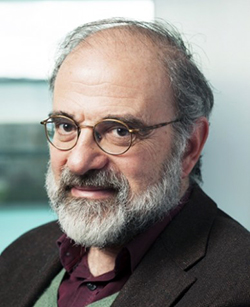Giuseppe Longo - Big Data, entre science et scientisme
- Keynote Speech

Due to the current situation, this keynote speech will (only) take place via the Zoom videoconference platform.
The invitation link for the zoom meeting is the following :
https://univ-grenoble-alpes-fr.zoom.us/j/98212291240?pwd=UHJWcjhoNElGTGdFUlM0ZHlmNkU2Zz09
Additional technical points (that will be reminded at the start of the speech) :
- PhD students should send a message containing their name to the moderator (Frédéric Prost) in order to collect presence for ED (Ecole Doctorale).
- Questions will be collected via written messages that the audience will send to the moderator (Frédéric Prost). You can send your questions during the speech, they will be recollected and asked to the speaker at the end of the speach.
If you have any questions regarding those technical points do not hesitate to contact the Keynote Team via mail :
- Frédéric Prost : Frederic.Prost AT univ-grenoble-alpes.fr
- Renaud Lachaize : Renaud.Lachaize AT univ-grenoble-alpes.fr
- Dominique Vaufreydaz : Dominique.Vaufreydaz AT univ-grenoble-alpes.fr
------------------------------------------------
Giuseppe Longo est directeur de recherche (DRE) CNRS au centre interdisciplinaire Cavaillès du laboratoire République des savoirs à l’Ecole Normale Supérieure, Paris (ENS). Ancien DR CNRS en mathématiques et, puis, en informatique, à l’ENS, il a été professeur de logique mathématique puis d’informatique à l’Université de Pise.
Giuseppe Longo a passé 3 ans comme chercheur et professeur invité aux USA (successivement à Berkeley, au MIT et à Carnegie Mellon) ainsi que plusieurs mois à Oxford (GB) et Utrecht (NL). Il a été fondateur et rédacteur en chef (1990-2015) de Mathematical Structures in Computer Science, une revue scientifique majeure de l’Université de Cambridge, de deux collections de livres et co-auteur d’une centaine d’articles et de trois livres. Ses recherches ont d’abord concerné la logique mathématique et ses diverses applications à l’informatique. Il a récemment étendu son champ de recherches à l’épistémologie des mathématiques et à la biologie théorique.
L'exposé aura lieu uniquement en visioconférence via Zoom
Very large databases are a major opportunity for science and data analytics is a remarkable new field of investigation in computer science. The effectiveness of these tools is used to support a ‘‘philosophy’’ against the scientific method as developed throughout history. According to this view, computer-discovered correlations should replace understanding and guide prediction and action. Consequently, there will be no need to give scientific meaning to phenomena, by proposing, say, causal relations, since regularities in very large databases are enough: ‘‘with enough data, the numbers speak for themselves’’.The ‘‘end of science’’ is proclaimed. Using classical results from ergodic theory, Ramsey theory and algorithmic information theory, we show that this ‘‘philosophy’’ is wrong. For example, we prove that very large data bases have to contain arbitrary correlations. These correlations appear only due to the size, not the nature, of data. They can be found in‘‘randomly’’ generated, large enough databases, which—as we will prove—implies that most correlations are spurious. Too much information tends to behave like very little information. The scientific method can be enriched by computer mining in immense databases, but not replaced by it.




